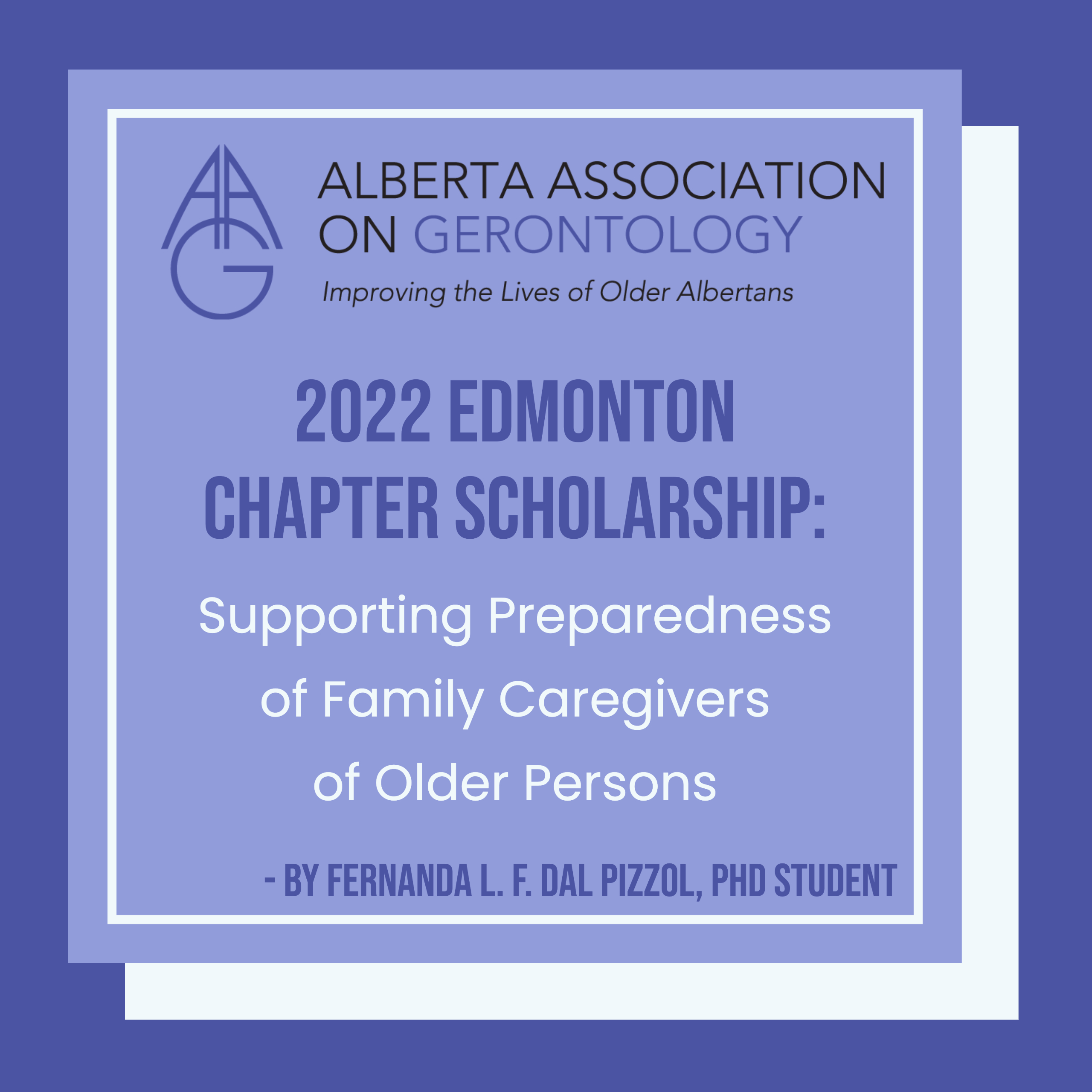2022 Edmonton Chapter Scholarship: Supporting Preparedness of Family Caregivers of Older Persons
It is widely known that the number of older adults is increasing worldwide (World Health Organization, 2018). With the heterogeneity of aging (Lowsky et al., 2014; Nguyen et al., 2021), we have individuals maintaining their independence and others becoming frail and experiencing functional limitations that require assistance from others. Stroke, for example, affects 10% of older Canadians (Government of Canada, 2019), often leaving them with numerous disabilities requiring support from caregivers (Government of Canada, 2009, 2016).
In most countries, including Canada, family caregivers (i.e., family, friends, and neighbors) hold primary responsibility for the care of older people who have some degree of dependency (Statistics Canada, 2020; World Health Organization, 2017). In 2018, 7.8 million Canadians (25% of the population) provided care to a family member or friend at home (Statistics Canada, 2020). In Alberta, nearly 2 in 5 Albertans (38%) have been a caregiver at some point in their life (Eales et al., 2021). While there are benefits in caregiving, other aspects, such as unmet needs, can lead caregivers to experience stress and health problems (Hestevik et al., 2019; Sabo & Chin, 2021).
Approximately 40% of caregivers report a lack of home support and information (Statistics Canada, 2020). It is important to provide support and information to caregivers to increase their preparedness, and thereby advance the health and wellbeing of older adults and their informal caregivers. In this context, distance support (e.g., by phone or video) has been discussed as a viable option (Solli & Hvalvik, 2019), becoming more attractive in the last decade with the increased use of personal computers and the adoption of online learning in elementary to post-secondary school systems (American Association of Retired Persons, 2016), especially after the COVID-19 pandemic (Merchant & Aprahamian, 2022). According to the 2016 American Association of Retired Persons nationally representative survey of caregivers (American Association of Retired Persons, 2016), 71% of caregivers are interested in technology to support their caregiving tasks and 59% say they are likely to use a currently available technology.
My interest in understanding caregiver preparedness began in my studies in Brazil when I adapted and validated an instrument that assesses the preparedness of caregivers of older people after a stroke (Dal Pizzol et al., 2020). Moreover, during my experience as a registered nurse in Brazil, providing telephone support to people in the community, I understood that distance interventions are a very important tool to support preparedness.
During my PhD, I want to understand more what this preparedness means for caregivers, as preparedness seems to encompass much more than the ability to assist with activities of daily living. While Archbold and colleagues (1990, p. 376) defined preparedness as “how well prepared the caregiver believes he or she is for the tasks and stress of the caregiving role”, the concept has been defined and operationalized in different ways over time. This has left the relative importance of preparedness for tasks compared to emotional preparedness, or willingness to provide care, as undertheorized.
As such, preparedness seems to encompass multiple components, and intervention programs that aim to support preparedness in this population need target each of these components. Although Alberta’s stroke prevention and treatment programs are recognized as the best in Canada (Alberta Health Services, 2021), resources to support and educate informal caregivers of older people after a stroke are limited (Mountain et al., 2020). Therefore, my dissertation research aims to advance understanding of the meaning of ‘preparedness’ and develop and assess acceptability of a multi-component distance intervention program that aims to support preparedness of caregivers of an older adult after a stroke.
My dissertation work is positioned within phases 1 (conceptual development) and 2 (feasibility and pilot testing) of the Medical Research Council (MRC) framework for developing and evaluating complex interventions (Medical Research Council, 2006; Skivington et al., 2021). MRC’s phases 3 (evaluation) and 4 (implementation) will be further developed as part of my academic career. My dissertation will focus on analyzing the concept of preparedness, and conducting a systematic review aimed at assessing the effects of distance intervention programs designed to promote preparedness among informal caregiver of older adults.
In a third dissertation study, I will use the results from the concept analysis and systematic review to develop a theoretically informed distance intervention and conduct and assess its acceptability from perspective of informal caregivers of older adults living with stroke and Alberta healthcare providers.
This stepwise approach will advance understanding of what preparedness is and how to effectively support preparedness for informal caregivers of older adults. The findings of this study will support the development of interventions to advance the health and wellbeing of older adults and their informal caregivers living in Canada.
by Fernanda L. F. Dal Pizzol, PhD student
with collaboration of Dr Kathleen Hunter and Dr Hannah O’Rourke (supervisors)
University of Alberta, Faculty of Nursing




